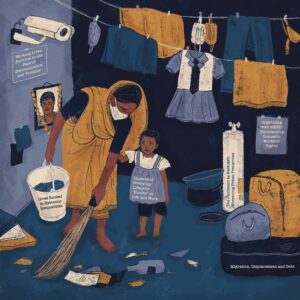A period of crisis and upheaval is causing serious consequences for the rights of domestic workers. Conditions of economic precarity, work, and income insecurity have long characterised their lives. We are witnessing a clear backlash against domestic workers’ rights. Like other informal women workers who live and work in precarious conditions, they have borne the brunt of the Covid-19 pandemic and its lockdowns and continue to face its devastating impacts.
Countering Backlash partner Gender at Work Consulting – India is sharing their stories in a forthcoming storybook titled ‘Reversing domestic workers’ rights: Stories of backlash and resilience in Delhi’ and launching in August 2023.

Illustration by by Mrinalini Godara
Contextualising backlash against domestic workers in India
One reason for the intensity of this backlash is the systemic inequalities in paid domestic work in India. Although it is one of the largest sectors of work for women in urban areas, paid domestic work has been systematically undervalued and inadequately recognised as work by the state, society, and employers.
There are deep-seated reasons for this, including the highly gendered perception of domestic work as an extension of women’s natural roles, and its performance in familial spaces. Domestic work is also mainly made up of women from marginalised groups, particularly those from migrant communities, Dalit, and Adivasi groups, and +women who have not completed a primary education.
Domestic work is therefore characterised by informality and precarity, with poor working conditions, as well as discrimination based on gender, caste, religion, and migrant status. The vagaries and stresses of urban lives lived on the margins, of the inaccessibility of public services and resources, also encompass a key feature of the living conditions for domestic workers.
Domestic workers telling their stories of backlash
The forthcoming storybook shares glimpses into the lives of domestic workers based in Delhi and the National Capital Region (NCR) in India. Launching in August 2023, it includes live-in and live-out domestic workers, who are both young and old, long-term and new migrants, from Dalit, Adivasi, and Muslim communities. The storybook surfaces and makes visible the everyday forms of caste, religious, and gendered discrimination, violence, and backlash experienced by domestic workers, which took on monstrous proportions during the pandemic.
The storybook illustrates the backlash experienced by domestic workers, highlighting the worrying pushback against their struggles and their rights. This sense of ‘going backwards’ has been expressed by one of the domestic workers in the storybook as ‘10-20 saal peechche chale gaye’ – translated from Hindi to English as ‘we have gone back 10-20 years’.
This is in a sector that has barely seen any gains on their rights as workers. There has been a systematic non-recognition of the rights of domestic workers as workers across the country despite persistent claims made by domestic worker groups. The few exceptions where their rights have been recognised (such as the inclusion of domestic workers in minimum wage notifications, their inclusion as workers for welfare, or the inclusion of households as a workplace under the sexual harassment law, all in just a few Indian states) serve as a reminder for just how limited the gains have been.
This sense of going backwards has taken a range of forms which are highlighted by each of the stories collated in the storybook in the context of the pandemic and prolonged lockdowns. Stories explore the:
- increased levels of discrimination, as well as high levels of economic vulnerability including increased indebtedness,
- devastating and widespread loss of livelihoods,
- decreased wages,
- food and housing insecurities,
- increased levels of work for those who remained or have since returned to work,
- and worsening physical and mental health.
In the wake of these troubling losses, domestic workers have suffered humiliations, indignities, and vilification at the hands of their employers and the state. They have been silenced and rendered powerless. They and domestic worker organisations, such as Shahri Mahila Kaamgar Union (SMKU – Urban Women Worker’s Union), have experienced further reversals in their collective negotiating power, which has set back their struggles several years. The pandemic served as the ‘moment of revelation’ of the backlash experienced by domestic workers.
We see this in Roopali’s and Sundari’s stories, where their lives have been overwhelmed by insecurities, family illnesses, and severe discrimination.
The storybook painstakingly demonstrates that the backlash experienced by domestic workers is built on a bedrock of systemic discrimination, marginalisation, and myriad ‘microscapes of harm’. Almost all of the stories highlight that the early lives of domestic workers were constrained by disadvantage, insecurity, and hardship. These are stories of early marriages, poor educational opportunities, and very young starts to working life in a context often circumscribed by economic distress.
The spectacle of backlash
Systemic injustices and violence that are rooted in caste and religious notions of ‘purity and pollution’ and experienced in forms such as ‘untouchability’, were heightened during the pandemic. Everyday events of marriage, divorce, illness, the birth of children, death of loved ones, migration, and more, have been experienced as ‘shocks’ by domestic workers. This has been alongside more systemic shocks of forced displacement, climate change, and the pandemic have been experienced in terms of the ‘spectacle of backlash’.
There are now immense challenges faced by domestic worker organisations such as SMKU in contending with this backlash in the context of the reduced negotiating power of domestic workers, as well as shifts in the sector with employers seeking more live-in, ‘full-time’ workers. Even so, as the storybook highlights, the crucial support offered by organisations such as SMKU through immediate relief efforts (such as providing rations or enabling domestic workers to access online benefits) proved invaluable in the critical months when domestic workers were facing perilous food insecurities. Their organising efforts have provided a critical lifeline of solidarity and support for domestic workers, even as they seek to collectively re-strategise their claims making efforts to contend with the backlash.
